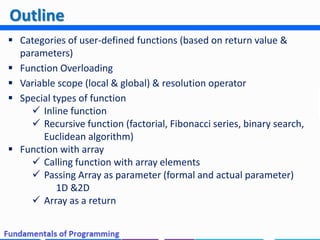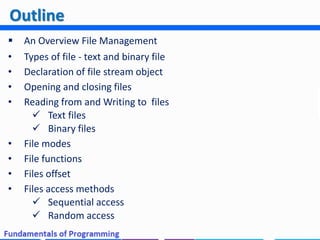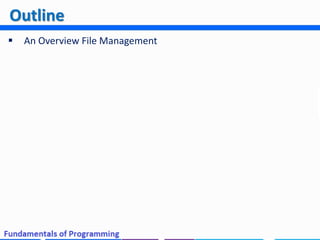Fundamentals of Computer Programming in C++ Key Concepts
- 1. Fundamentals of Computer Programming Summary of Key Concepts Chere L. (M.Tech) Lecturer, SWEG, AASTU
- 2. Chapter One Basic Concepts of Programming Chapter 1 2
- 3. Outline Basics of Program Development What is computer programming? Reasons to study programming An Overview of Program Development Life Cycle Problem Solving Skills Algorithm Design using flow chart and Pseudo codes Programming Languages Generations Programming Languages Paradigms Chapter 1 3
- 4. Chapter Two Basic Programming Constructors Chapter 1 4
- 5. Outline Structure (Anatomy) of C++ program Preprocessor and library functions main() function Statement and Block Compilation Process and running programs: Basic Elements of program (Syntax and Semantics) Input/output standards Variables and Data types, Constants Operators and expression Debugging and Programming Errors Formatting Program {Comment, braces, Indentation and White space} Formatted Input-Output Chapter 2 5
- 6. Chapter Three Program Flow Control Chapter 1 6
- 7. Introduction to flow controls Branching flow controls (selection statements) One-way selection Two-way selection Multiple selection switch statement Iterative flow controls (Looping statements) for loop while loop do . . . while loop Jumping statements - break statement, continue statement, goto statement Program termination statements (return, exit, abort) Outline
- 8. Chapter Four Array and String Chapter 1 8
- 9. Introduction to array - foundation Concepts Array Declaration One Dimension Array and Two Dimension Array Array Initialization (During declaration and After declaration) One Dimension Array and Two Dimension Array Accessing Array Elements Assignment, Copying, Input/Output, and Other Array manipulation An Overview of Strings String Declaration and Initialization String Manipulation I/O operation, Copying, Compare, Concatenate, Case conversion, string length, string search, string replace, string remove etc. Outline
- 11. Outline ▪ Variables in a Memory ▪ Basics of Pointers ▪ What is pointer? ▪ Why pointers ▪ Pointer Declaration ▪ Pointers Initialization ▪ Pointer Operators (& and *) ▪ Types of Pointers NULL Pointer Void pointers Pointers of Pointer Dangling Pointers Wild Pointers ▪ Pointers Expression Pointers Arithmetic Pointers Comparison ▪ Pointers and Constants ▪ Pointers and Arrays/Strings ▪ Pointers with Function Parameter pass-by-address Pointer as return type/value ▪ Dynamic Memory Management Memory Allocation (new) Memory Allocation (delete) ▪ Smart Pointers (new) Chapter 5 11
- 13. Function Declaration and Definition (prototype) Type of functions (built in and user-defined) Function Calling and return value Calling by (variable, constant, literal, other function) Return value (variable, literal, expression, other function) Function Parameter Syntax (formal syntax and informal/unusual style ) Types of Parameter (Actual parameters and formal parameters) Parameter passing (by value, reference, pointer) Default parameter (order of parameter will matter) Outline Parameter pass by pointer will discussed in later chapter
- 14. Categories of user-defined functions (based on return value & parameters) Function Overloading Variable scope (local & global) & resolution operator Special types of function Inline function Recursive function (factorial, Fibonacci series, binary search, Euclidean algorithm) Function with array Calling function with array elements Passing Array as parameter (formal and actual parameter) 1D &2D Array as a return Outline
- 16. Introduction to User Defined Data type (structure) Defining structure (with tag and without tag) Declaring structure variable At the time of defining structures {definition + declaration} After defining the structures Initializing structure elements While you defining the structures {definition + declaration + initialization} During structure variable declaration {declaration + initialization} Accessing structure elements Array inside structure (as structure element) Nested structure Defining structure within structure Using structure variable other structure definition Outline
- 17. Array of structure Structure with function Structure variable as parameters Returning structure variable Other user defined data type Class and Object Anonymous unions (union) Enumerated types (enum) Typedef Outline
- 18. Chapter Eight File Handling Chapter 1 18
- 19. An Overview File Management • Types of file - text and binary file • Declaration of file stream object • Opening and closing files • Reading from and Writing to files Text files Binary files • File modes • File functions • Files offset • Files access methods Sequential access Random access Outline
- 20. Chapter Nine Templates and Vectors Chapter 1 20
- 21. An Overview File Management Outline
- 22. Thank You For Your Attention!! 22





















